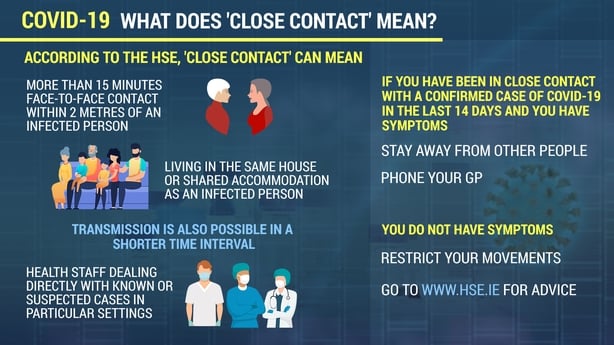A health expert has warned that ending the five-day isolation period for fully vaccinated close contacts who do not have any Covid-19 symptoms would be abandoning a key tool in breaking chains of transmission of the virus.
Professor of Immunology at DCU Christine Loscher said she would have "expected" a derogation of the rules to allow an easing on staffing pressures in parts of society, which, she said, was recommended by the European Centre for Disease Control.
Her comments come as the Cabinet approved changes to the rules around isolation periods for Covid-19.
Speaking on RTÉ's Morning Ireland, Prof Loscher said she cannot find data to show how efficiently close contacts translate into cases with Omicron over the last four to five weeks in Ireland.
"It seems like we've abandoned our approach to close contacts, which we have to remember is a key tool in our box in breaking chains of transmission," she said.
"This is not a one size fits all. I think there's a degree of concern that there is a potential additional exposure to people who are vulnerable. We put everything in this pandemic to protect them and I think that close contact rule was a key part of that and now it seems to be completely gone."
She added that the Omicron variant has given Ireland the "opportunity" to "build population immunity" without a significant increase in ICU admissions, saying that Ireland could be in a "very good position in the next eight to ten weeks."
"I'm optimistic because we're not seeing the translation, particularly into ICUs, which means it is appearing to present as a milder infection in most individuals," Prof Loscher said.

Meanwhile, a Shannon-based GP based has said the proposed changes to close contacts represent a massive change that go further than the European Centre for Disease Prevention and Control (ECDC) advice.
Dr Yvonne Williams said that while there is merit to the changes in terms of the economy and healthcare systems, she would be concerned that large number of close contacts would continue going to bars, restaurants and the shops.
This could cause an increase in cases, she warned.
Dr Williams said there is no official data from the HSE to say how many close contacts in a house are testing positive once there is a Covid case in that house, but that GP experience would suggest it could be as high as 60% to 70%.
Speaking on RTÉ's Today with Claire Byrne, she said details in terms of the precautions that close contacts must take remains to be seen and there needs to be a campaign to raise awareness of the symptoms of Covid-19 because they are so varied.
Dr Williams said changes to the isolation period will apply to people who have been well for the previous 48 hours and that it would make sense for people to have a negative antigen test before they end their isolation period.
She added that changes to the PCR test requirement does have implications for GPs and they would like some clarity as to whether GPs will need to provide certificates for people based on an antigen test.
Masks and antigen tests should be free for everyone - Doran
Meanwhile, former INMO general secretary Liam Doran said antigen tests and medical grade face masks should be free to everyone in the country.
"Antigen tests and face masks have the same importance to the building blocks of recovery as vaccinations, and vaccinations are free," he said.
Speaking on the same programme, Mr Doran said antigen tests must be "immediately" available to people who need them, via GPs, pharmacies, and other access points.
"We shouldn't be relying on the website and the post office to deliver something that is immediately needed."
Any relaxation in Covid-19 rules will "bring fears", he added.
The changes that Cabinet will decide on are "very significant", Mr Doran said, and said "clear communication" is required to avoid confusion among the general public about which rules apply to them.

